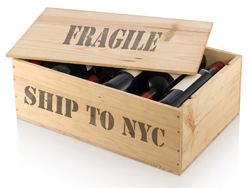#2 STORY of 2010: HR 5034 Update

First Published in the August 2010 Edition
By Karl Klooster
By now the Wine & Spirits Wholesalers of America must have gotten the message that no one in the industry other than themselves is supportive of further restricting direct sales of wine among the states.
An open letter to Congress jointly issued on June 23 by WineAmerica, representing more than 800 wineries nationwide, California’s Wine Institute, the Distilled Spirits Council, the Brewers Association and the Beer Institute emphatically underscored their position.
The first paragraph sums up the sentiments of these leading trade organizations and their thousands of members nationwide.
“We, the undersigned beer, wine and spirits associations, representing virtually all alcoholic beverages produced in the 50 states, respectfully request you to preserve the effectiveness of the existing state-based alcohol regulatory system — and support the constitutional principles that protect the marketplace against discriminatory and anti-competitive state laws — by rejecting HR 5034.”
Specifically, they went on to point out, “HR 5034 would allow states to pass laws that violate the dormant Commerce Clause, federal anti-trust laws and other Acts of Congress.”
Despite this adamant and overwhelming opposition, the nation’s wine and beer distributors apparently remain intransigent. From all evidence to date, they intend to deploy every weapon at their disposal in their effort to persuade Congress to pass this oppressive piece of legislation.
The most recent salvo in the ongoing battle has been launched in the form of a flanking maneuver. The American Association of Wine Economists released a document this month that is certain to stir up controversy in the camp opposed to HR 5034.
AAWE Working Paper No. 61 is titled “Direct Shipment Blowout: How the Supreme Court’s Granholm Decision Has Led to a Flood of Non-taxed Wine Shipments.”
The 22-page report was researched and written by the principal and staffers at John Dunham & Associates, a Brooklyn, New York-based consulting firm specializing in strategies to influence legislation.
The biased viewpoint from which Dunham proceeds in crafting arguments and position statements on behalf of its clients is clearly evident in their self-promotional pitch.
“We concentrate on unique issues and objectives in order to provide effective economic analyses that help advance policy objectives while mitigating risks and threats.
“We are experts at translating complex economic concepts into easily understandable messages for any audience. We provide cover and materials to sway legislative votes.”
In other words, they cleverly skew the interpretation of data in an effort to create a self-serving result, not to present a fair and balanced overview.
Only an expert could fully parse the terminology, much less comprehend the methodology upon which the conclusions were based. But it doesn’t take a statistical genius to understand this.
An exhibit included in the report, titled “Appendix B, Loss of Revenue Due to Direct Ship in 2008” states that the estimated total loss for that year was $493,733.68.
U.S. wine production in 2008 was valued at $12.5 billion, and direct shipping’s share was estimated at 10.4 percent of the total, or $1.3 billion. The lost revenue would then amount to about 38/100ths of 1 percent.
A small sum, but a loss, nonetheless that, if correct, ought to be addressed. However, the exhibit brings up a problematic question that places the White Paper’s validity in doubt.
Of the purported $493.733.68 in lost tax, $399,103.67 is attributed, without any explanation of the disparity, to just three states — Virginia at a staggering $256,567.71, Iowa at $72,4423.18 and Ohio at $70,092.78.
That leaves just $94,630.01 owed to the remaining 47 states, or an average of $2,013.41 per state. The largest amount was $15,324.40 in Florida and the lowest, $27.83 in Louisiana.
In addition to obviously exaggerated claims of adverse tax implications, other arguments set forth in the Working Paper are pointedly designed to chip away at the edges of Granholm v. Heald in an unsubtle effort to challenge its constitutionality.
Given the foregoing, does it come as any surprise to learn that the Wine & Spirits Wholesalers of America is one of Dunham’s prominent clients?
Would it be of further interest that the working paper’s research, conducted and interpreted by Peter Ronga, a Dunham intern, was funded by a grant from that very same organization?
Furthermore, as a member of the AAWE, Dunham & Associates is able to use that ostensibly neutral, nonprofit forum to put forth its position. This affords them a seemingly authoritative legitimacy without any critical counterpoint.
Commenting on Working Paper No. 61, WineAmerica president Bill Nelson gave this stingingly succinct analysis. “It is a seriously flawed document.”
At the time Nelson was interviewed, the industry was awaiting House Judiciary Committee hearings on HR 5034, scheduled for mid-July. Although never placed on the committee’s official calendar, staffers were securing commitments for testimony on July 14.
However, those hearings have been put on hold. According to industry sources, a postponement was necessary to evaluate possible constitutional problems in the bill.
If a ruling were to go against HR 5034, it would substantially reduce the wholesalers’ alternatives. Still, they appear intent on pursuing every possible avenue. The endgame, after all, is about money.
The wholesalers couldn’t care less whether or not state taxes are paid. But they adore the idea that the argument could bring about the desired result — exclusive control of wine distribution for them.
As much as one would like to think logic and rectitude will ultimately emerge victorious, that remains far from a certainty. Anyone who deals with legislators on a regular basis can attest to how complex and convoluted the government process can be.
How the rules of the game are interpreted by those in a position to determine the outcome may be about who is best at winning the battle behind the scenes.
Whatever means and methods make the difference in determining the final decision, however, and whichever side gets its way, it’s still important to note that many of the producers, who oppose the bill, and the wholesalers, who initiated it, will continue to need one another.












